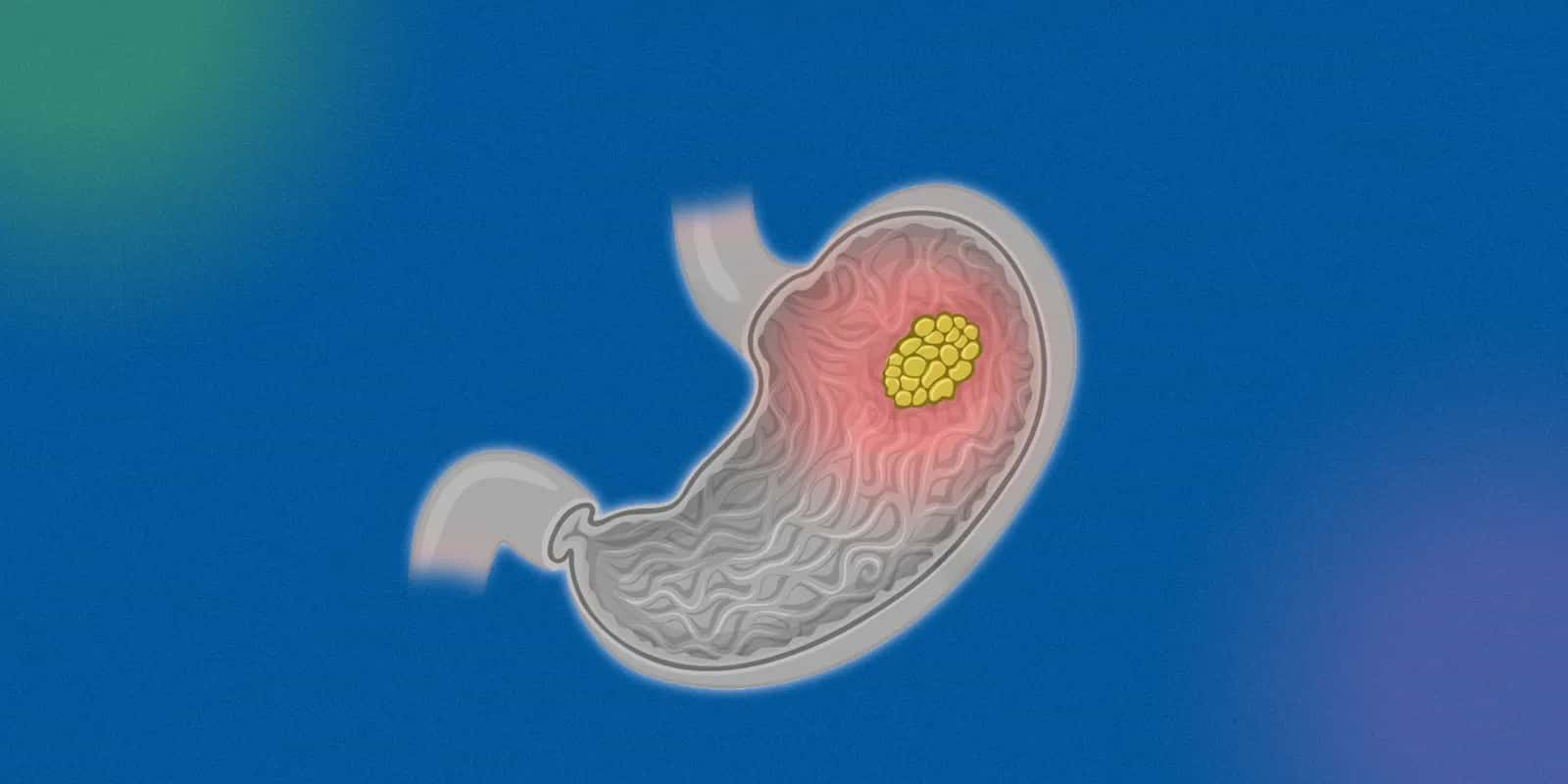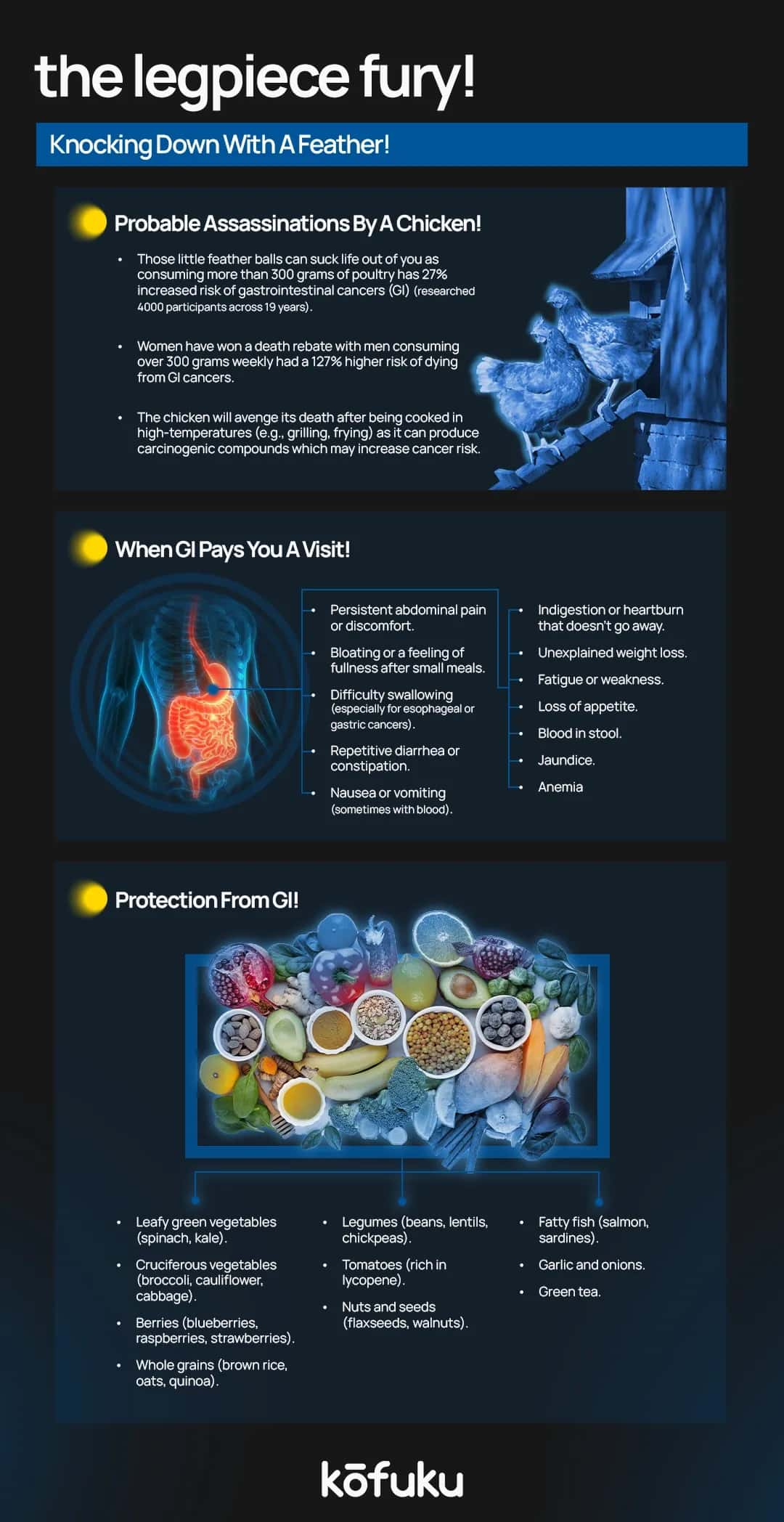Home
Blogs
Lifestyle Diseases
What Came First? The Chicken Or The Egg? Apparently, Gastrointestinal Cancer
What Came First? The Chicken Or The Egg? Apparently, Gastrointestinal Cancer

Introduction
The ubiquitous chicken. No other animal has been exploited as much just so that the human race could eat. People began eating chicken for food around 200-400 BC. While chickens were initially domesticated for fighting, not food, we started eating them somewhere down the line.
Domestication of chickens is estimated to have occurred around 8,000 years ago in Southeast Asia.
For the past 8,000 years, we have domesticated and bred chickens—not just for survival, but increasingly for profit. What began as a natural, free-roaming bird in the jungles of Southeast Asia has gradually been transformed into a factory-farmed commodity.
Through selective breeding, some really high-tech farming practices, and the use of antibiotics and, in some cases, steroids, we’ve shaped the modern chicken into a far cry from its wild ancestors.
Today’s commercial broiler chicken is fattened up to unnatural sizes in a matter of weeks, often unable to fly, run, or even stand properly for long periods. Many are reared in cramped, light-controlled environments, their biology manipulated to meet ever-increasing demands for cheap, fast protein. All this while they’re constantly defecating on each other.
The result? A bird that’s more product than creature—bloated, fragile, and often riddled with health issues and bacteria. In our quest for convenience and abundance, we’ve traded quality and ethics for volume and efficiency.
And now they’re saying that if you eat it, you stand to get gastrointestinal cancer.
No way! Really?
The Study
An Italian Cohort Study carried out in 2025 claims that eating a lot of chicken can give you gastrointestinal cancer. The study analysed over 4,000 participants over approximately 19 years.
Findings: Eating more than 300 grams of poultry per week was linked to a 27% increased risk of all-cause mortality. Specifically, for gastrointestinal cancers, the risk was 2.27 times higher for those consuming over 300 grams weekly.
What Does This Mean?
This statistic shows a major health concern, linked to high poultry consumption. Such findings suggest that excess poultry intake could contribute towards long-term health issues, probably because of the way the meat is processed, farmed or cooked.
Anyways, there are factors like high-temperature cooking, additives, or being exposed to antibiotics and hormones that could be a major health concern. For people and public health professionals, this underscores the importance of moderation and dietary variety.
So, Where Are We At With the Gastrointestinal Cancer Scare?
Culinary snowflakes. Relax. Eating chicken is not going to give you cancer, any more than eating bread will cause depression. The Italian study says don’t eat more than 300 grams of chicken per week.
Okay. Don’t banish the bird from your dinner plate forever. It’s a stark reminder that moderation matters. In today’s day and age, chicken is everywhere. Found in fast food, meal preps, home kitchens and running across the road in your average Indian city.
We go overboard even without realising it. However, your nutritional needs can be totally met through a diverse, balanced diet that doesn’t depend too much on one source of protein. Try some legumes, fish, or plant-based alternatives occasionally.
Today, science isn’t saying, “Stop eating chicken completely.” What it is nudging us to do is try some variety.

Also, It’s Not What You’re Cooking But How You’re Cooking It
The way chicken is prepared and processed plays a huge role in its potential health risks. High-temperature cooking methods like grilling, roasting or frying can lead to the formation of carcinogenic compounds, known as heterocyclic amines or (HCAs) which have been linked to gastrointestinal cancers in various studies.
Additionally, many packaged and processed chicken products are loaded with preservatives and chemical additives to boost flavour, colour and shelf-life - such substances are disastrous for gut health, and contribute to inflammation.
Industrial poultry farming is big on antibiotics and growth-promoting substances, which can completely ruin gut microbiota when eaten over time, messing with the body’s natural defences.
Also, fast-food chicken is usually coated with seasoned breading and marinades that are rich in sodium, artificial flavours and emulsifiers - all of which can pose major health risks when consumed in excess.
What Are The Public Health Implications?
Poultry, especially chicken, has grown to be a global dietary staple. It’s marketed as a lean, healthy protein. The go-to choice from gym bros to moms feeding their children. Over the past, chicken consumption has skyrocketed globally, replacing red meat in the average diet.
Now, the chickens have come home to roost.
Studies, such as the recent Italian cohort, bring attention to the unintended consequences of blindly trusting health marketing, without reading the fine print.
We were constantly bombarded with “chicken is healthy” which led to frequent consumption, sometimes daily, without taking into account preparation methods, balance or sourcing.
Today, we live in an environment where convenience dictates culinary choices. Moderation is no longer second nature. Meals are built for speed, not reflection. Portion control be damned, all we’re worried about is meal preps and fast food combinations.
Public health messaging should ideally step in. Studies that link poultry intake with increased incidences of gastrointestinal cancer shouldn’t cause panic, but should be a cause for re-evaluation.
We must move beyond “what” to eat, and look at “how much” and “how often” and, more importantly, “how it’s prepared”. Variety should be the name of the game, and we should incorporate plant proteins, legumes, and fish so people can rethink the default protein source on their plates.
Time to Panic, It’s Not Organic?
Chicken isn’t poisonous. Your Sunday roast isn’t going to send you to the ICU with cancer.
If anything, the Italian study brings to the fore a potential risk - which focuses heavily on excess. Eating more than 300 grams of poultry per week could increase your risk. Moderation and mindful preparation are your best friends.
Also, cook it cleanly. Look at boiling, steaming or baking instead of the Indian standard of deep frying or grilling at scorching temperatures - and you’re already safe. The risk also banks on other lifestyle factors.
Here you have people drinking litres of alcohol and smoking multiple cigarettes a day, worried about whether their dinner might be the problem.
Perspective is important. This study is an important nudge, not a nutritional death sentence. It’s a clarion call to diversify your protein sources - look into how your food is prepared and don’t go overboard. This isn’t a restriction, it’s a reset.
What Can I Eat Instead?
You don’t have to sacrifice nutrition or flavour. There are a lot of heart-healthy, protein-rich foods just waiting to be eaten.
-
Fish (like salmon, mackerel, sardines): Rich in omega-3 fatty acids, great for heart and brain health.
-
Legumes: Lentils, chickpeas, and black beans provide protein, fibre, and essential minerals.
-
Tofu & Tempeh: Excellent plant-based protein sources, especially in stir-fries or curries.
-
Nuts & Seeds: Almonds, walnuts, chia seeds, and flaxseeds offer protein, healthy fats, and fibre.
-
Eggs (in moderation): High-quality protein and nutrients like B12 and choline.
-
Whole grains: Quinoa, bulgur, and brown rice complement protein sources and add fibre.
-
Vegetables: Cruciferous veggies like broccoli and cauliflower are fibre-rich and anti-inflammatory.
Sample Weekly Meal Plan
-
Mon: Lentil curry + brown rice
-
Tue: Grilled salmon + quinoa salad
-
Wed: Chickpea stir-fry + whole wheat noodles
-
Thu: Tofu and veggie bowl
-
Fri: Black bean tacos + avocado
-
Sat: Baked eggs with spinach + sweet potato
-
Sun: Tempeh wrap + mixed greens

Conclusion
When we first stumbled upon the idea that eating chicken could increase the risk of gastrointestinal cancer, we were shocked. And we quickly demonised the humble chicken immediately. We couldn’t be further from the truth. Also it’s time to reevaluate modern eating habits.
The Italian study gives us an important perspective on how overconsumption, together with industrial farming and unhealthy cooking methods, can send us to an early grave.
It’s not about banning chicken, but about balance. Variety, moderation and mindful preparation thrown in for equal measure. A diverse diet, rich in legumes, fish, whole grains and vegetables offers nutritional balance while bringing down long-term health risks.
In a world that chases convenience over conscious choices, this is a reminder to reflect on how we source, prepare and portion our food. Chicken is not the villain - mindlessness is. Don’t panic. Simply pivot.
Shift to cleaner cooking methods, eat a wide variety of proteins and remember - what’s on your plate is not just your next meal, but a factor for your future health. Also, a lot more variety, and awareness, would do us all a lot of good. Isn’t it?
FAQs
Q. Does eating chicken definitely cause gastrointestinal cancer?
A. No, eating chicken in moderation is not proven to cause cancer. However, excessive consumption, especially over 300 grams per week, as noted in the Italian study, may increase the risk.
Q. Is grilled or fried chicken more harmful than boiled or steamed?
A. Yes. High-temperature cooking methods like grilling or frying can produce harmful compounds like heterocyclic amines (HCAS), which have been linked to gastrointestinal cancers. You’re much better off boiling, steaming, or baking.
Q. How much chicken is safe to eat per week?
A. Based on the study, consuming less than 300 grams per week—roughly 2 to 3 servings—is considered a moderate and safer amount.
Q. Can switching to organic chicken reduce the risks?
A. Organic chicken may reduce exposure to antibiotics and growth hormones, but the risks associated with overconsumption and high-heat cooking still apply.
Q. What are the best alternatives to chicken for protein?
A. Great alternatives include fish (especially fatty fish like salmon), legumes, tofu, tempeh, eggs (in moderation), nuts, seeds, and whole grains like quinoa.


Comprehensive Guide to Superfood Nutrition for Better Health

Understanding Gut Health and Wellness Impact

Understanding Stomach Troubles – Symptoms and Remedies


